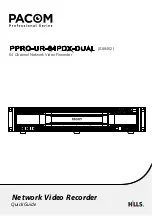
SVmco User Guide
135
# rm /etc/blkid/blkid.tab
If the cache file exists with /etc/blkid/blkid.tab retaining the file
system configuration, Red Hat Enterprise Linux uses the
information in the file as it checks the file system with the fsck
command.
The system status will not match the /etc/blkid/blkid.tab
contents during hot replacement, hot addition, or hot removal of
disks. For this reason, the check at the next execution of the fsck
command will be incorrect, which may damage the file system.
Once created, this file is not updated. That is why the cache file
must be deleted after hot replacement, addition, or removal of a
hard disk as well as before static replacement, addition, or
removal of a hard disk.
Deleting the cache file does not cause any problems because it will be re-
created as needed.
Stop the smartd service (Red Hat Enterprise Linux 5).
During hot maintenance of a hard disk (hot replacement, addition, or
removal), stop the smartd service.
The smartd service is intended to monitor a hard disk by using the self-
diagnosis function of the hard disk, S.M.A.R.T. (Self-Monitoring, Analysis
and Reporting Technology System).
The smartd service does not support the hot maintenance of a hard disk,
so that the hard disk information acquired at the start of the smartd service
will not match the hard disk information after the hot maintenance.
Consequently, it will output the following message every 30 minutes.
smartd[XXXXX]: Device: /dev/YYY, No such device, open()
failed
XXXXX and YYY: These parts vary with the environment.
















































